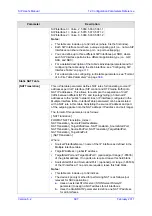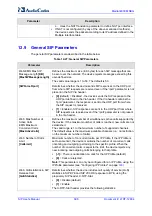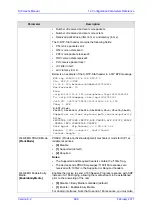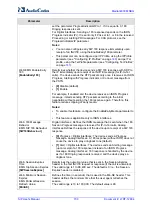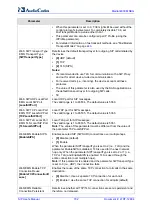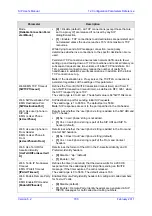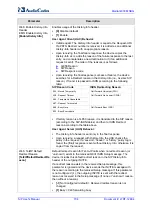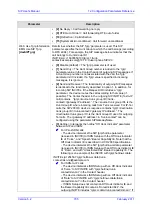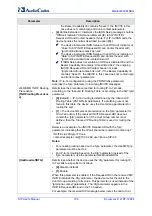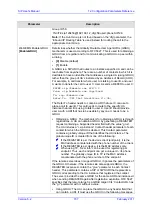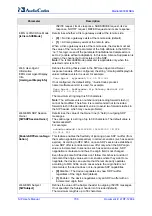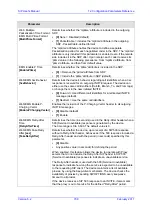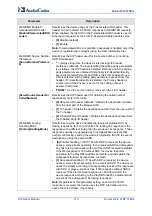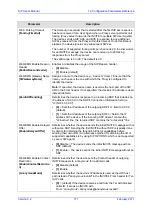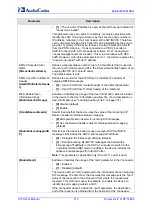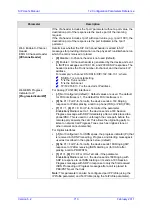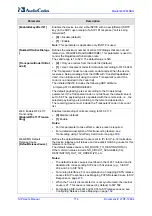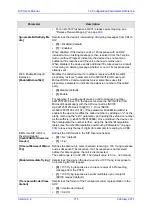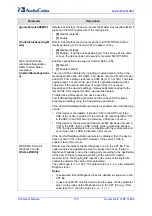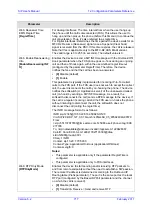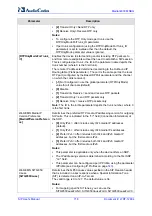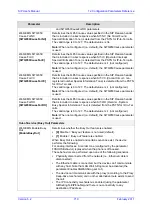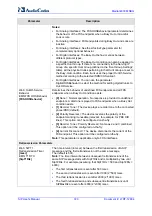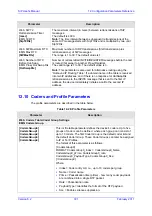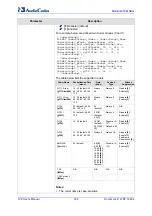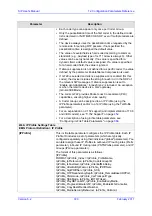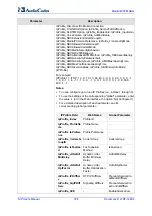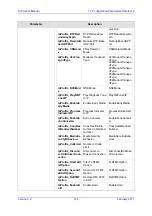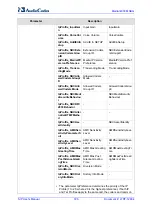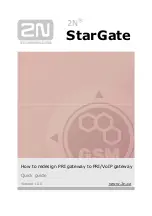
Version 6.2
711
February 2011
SIP User's Manual
12. Configuration Parameters Reference
Parameter
Description
Web: Forking Timeout
[ForkingTimeOut]
The timeout (in seconds) that is started after the first SIP 2xx response
has been received for a User Agent when a Proxy server performs call
forking (Proxy server forwards the INVITE to multiple SIP User Agents).
The device sends a SIP ACK and BYE in response to any additional
SIP 2xx received from the Proxy within this timeout. Once this timeout
elapses, the device ignores any subsequent SIP 2xx.
The number of supported forking calls per channel is 20. In other words,
for an INVITE message, the device can receive up to 20 forking
responses from the Proxy server.
The valid range is 0 to 30. The default is 30.
Web/EMS: Enable Reason
Header
[EnableReasonHeader]
Enables or disables the usage of the SIP Reason header.
[0]
Disable
[1]
Enable (default)
Web/EMS: Gateway Name
[SIPGatewayName]
Assigns a name to the device (e.g., 'device123.com'). Ensure that the
name you choose is the one with which the Proxy is configured to
identify the device.
Note:
If specified, the device name is used as the host part of the SIP
URI in the From header. If not specified, the device's IP address is used
instead (default).
[ZeroSDPHandling]
Determines the device's response to an incoming SDP that includes an
IP address of 0.0.0.0 in the SDP's Connection Information field (i.e.,
"c=IN IP4 0.0.0.0").
[0]
= Sets the IP address of the outgoing SDP's c= field to 0.0.0.0
(default).
[1]
= Sets the IP address of the outgoing SDP c= field to the IP
address of the device. If the incoming SDP doesn’t contain the
"a=inactive" line, the returned SDP contains the "a=recvonly" line.
Web/EMS: Enable Delayed
Offer
[EnableDelayedOffer]
Determines whether the device sends the initial INVITE message with or
without an SDP. Sending the first INVITE without SDP is typically done
by clients for obtaining the far-end's full list of capabilities before
sending their own offer. (An alternative method for obtaining the list of
supported capabilities is by using SIP OPTIONS, which is not supported
by every SIP agent.)
[0]
Disable = The device sends the initial INVITE message with an
SDP (default).
[1]
Enable = The device sends the initial INVITE message without an
SDP.
Web/EMS: Enable Contact
Restriction
[EnableContactRestrictio
n]
Determines whether the device sets the Contact header of outgoing
INVITE requests to ‘anonymous’ for restricted calls.
[0]
Disable (default)
[1]
Enable
[AnonymousMode]
Determines whether the device's IP address is used as the URI host
part instead of "anonymous.invalid" in the INVITE's From header for Tel-
to-IP calls.
[0]
= (default) If the device receives a call from the Tel with blocked
caller ID, it sends an INVITE with
From: “anonymous”<[email protected]>
Summary of Contents for Mediant 800 MSBG
Page 2: ......
Page 366: ...SIP User s Manual 366 Document LTRT 12804 Mediant 800 MSBG Reader s Notes ...
Page 372: ...SIP User s Manual 372 Document LTRT 12804 Mediant 800 MSBG Reader s Notes ...
Page 390: ...SIP User s Manual 390 Document LTRT 12804 Mediant 800 MSBG Reader s Notes ...
Page 404: ...SIP User s Manual 404 Document LTRT 12804 Mediant 800 MSBG Reader s Notes ...
Page 616: ...SIP User s Manual 616 Document LTRT 12804 Mediant 800 MSBG Reader s Notes ...
Page 636: ...SIP User s Manual 636 Document LTRT 12804 Mediant 800 MSBG Reader s Notes ...
Page 652: ...SIP User s Manual 652 Document LTRT 12804 Mediant 800 MSBG Reader s Notes ...
Page 886: ...SIP User s Manual 886 Document LTRT 12804 Mediant 800 MSBG Reader s Notes ...

